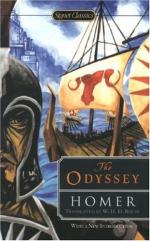{138} No hawk can tear its prey while it is on the wing.
{139} The text is here apparently corrupt, and will not make sense as it stands. I follow Messrs. Butcher and Lang in omitting line 101.
{140} i.e. to be milked, as in South Italian and Sicilian towns at the present day.
{141} The butchering and making ready the carcases took place partly in the outer yard and partly in the open part of the inner court.
{142} These words cannot mean that it would be afternoon soon after they were spoken. Ulysses and Eumaeus reached the town which was “some way off” (xvii. 25) in time for the suitor’s early meal (xvii. 170 and 176) say at ten or eleven o’ clock. The context of the rest of the book shows this. Eumaeus and Ulysses, therefore, cannot have started later than eight or nine, and Eumaeus’s words must be taken as an exaggeration for the purpose of making Ulysses bestir himself.
{143} I imagine the fountain to have been somewhere about where the church of the Madonna di Trapani now stands, and to have been fed with water from what is now called the Fontana Diffali on Mt. Eryx.
{144} From this and other passages in the “Odyssey” it appears that we are in an age anterior to the use of coined money—an age when cauldrons, tripods, swords, cattle, chattels of all kinds, measures of corn, wine, or oil, etc. etc., not to say pieces of gold, silver, bronze, or even iron, wrought more or less, but unstamped, were the nearest approach to a currency that had as yet been reached.
{145} Gr. is [Greek]
{146} I correct these proofs abroad and am not within reach of Hesiod, but surely this passage suggests acquaintance with the Works and Ways, though it by no means compels it.
{147} It would seem as though Eurynome and Euryclea were the same person. See note {156}
{148} It is plain, therefore, that Iris was commonly accepted as the messenger of the gods, though our authoress will never permit her to fetch or carry for any one.
{149} i.e. the doorway leading from the inner to the outer court.
{150} Surely in this scene, again, Eurynome is in reality Euryclea. See note {156}
{151} These, I imagine, must have been in the open part of the inner courtyard, where the maids also stood, and threw the light of their torches into the covered cloister that ran all round it. The smoke would otherwise have been intolerable.
{152} Translation very uncertain; vide Liddell and Scott, under [Greek]
{153} See photo on opposite page.
{154} cf. “Il.” ii. 184, and 217, 218. An additional and well-marked feature being wanted to convince Penelope, the writer has taken the hunched shoulders of Thersites (who is mentioned immediately after Eurybates in the “Iliad”) and put them on to Eurybates’ back.
{155} This is how geese are now fed in Sicily, at any rate in summer, when the grass is all burnt up. I have never seen them grazing.




